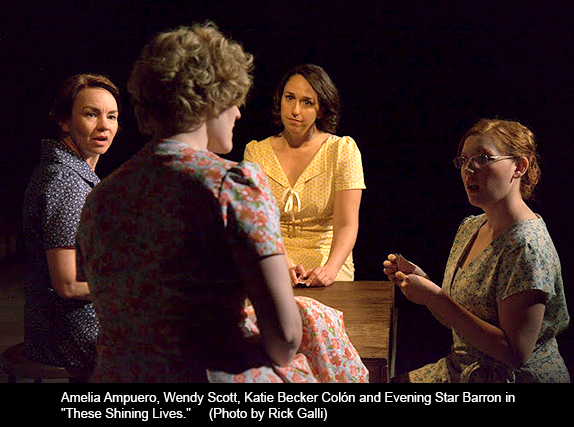Guera

Americans tend to think of the pursuit of happiness as one of our inalienable rights, but the phrase means not that society gives us happiness but that it offers choices that allow us to seek it. But what if we don’t have choices?
Two new plays in Albuquerque focus on young women whose choices are foreclosed, whose destiny is tragedy. That these stories occur nearly a century apart merely shows that the prison bars of ethnicity, gender and social milieu are endemic in America.
Guera, a one-woman performance at Working Classroom in the Barelas neighborhood, is about a Spanish girl growing up in the barrio who slips from one bad choice to another, although the inevitability of her destruction denies even the possibility of true choice.
Ironically, the performer is Lisandra Tena, a young Albuquerque Hispanic who was a poor and homeless high school dropout. Unlike the young Hispanic character of Guera, however, Tena, by grace of grit, luck and talent, was able to discover choices. She made the right ones.
With helping hands from the U.S. Job Corps, Albuquerque’s Working Classroom theater program, CNM and DePaul University’s Theater School (where she graduated magna cum laude with a bachelor’s degree in fine arts on a scholarship form Working Classroom), she has become an accomplished actress in Chicago. She has appeared in numbers plays, commercials and short films, and has a recurring role in NBC’s Chicago PD. The Chicago Tribune listed her as one of the 10 hot new faces of Chicago theater.
For two weeks, she is returning to her Albuquerque roots. She was enthusiastically cheered Saturday night at Working Classroom and on Monday met with students at the Job Corps in Albuquerque.
Guera, which premiered in Chicago’s Yo Solo Festival for Latino Shows, has four scenes, each a course in a banquet chosen by the audience. The play was written by Tena and clearly drawn from own experiences, although the decline of Guera is the opposite of her own triumphal success. Despite its tragic trajectory however, the story is told with wit and élan, recalling the “laugh-clown-laugh” of numerous sad-funny photos and drawings.
Working Classroom describes itself as “a street conservatory that identifies and recruits talented young artists and actors from Albuquerque’s historically ignored communities—and provides tuition-free education and training, including college scholarships. Classes are taught by the country’s top artists, playwrights and directors -professionals who welcome new creative opportunities and a prestigious venue for cutting-edge work.”
The play continues at its Paul Carpenter y Salazar Theater on Thursday-Sunday until May 25. For reservations and information call 505-242-9267 or go to workingclassroom.org
These Shining Lives

These Shining Lives, the current production of Duke City Repertory Theatre at The Cell, begins in 1921 and takes place during the ensuing two decades. It is a story of four women who take the only relatively well paid work they can find: painting luminous numbers on watch dials. Unfortunately for them, the material they paint with is radioactive radium.
The women are told to lick the bristles of their brushes to create a fine point, then dip the bristles in water and radium powder. The radium poisons them, destroys their jaws and causes bone cancer.
This a true story of the so-called “radium girls.” Thousands of them were employed painting watches and clocks in many cities in the Untied States and Canada. Several books and plays have been written about their tragedy. The lawsuits resulting from it fundamentally changed American law on the responsibility of employers and the right of employees to sue.
For years, the girls believe the assurances of the company, Radium Dial, that the radium is not only harmless but actually medicinal. They ignore their increasing illnesses until they can hardly bear the pain. Company doctors assure them that all is well and they should just take aspirin. Company bosses deny there are any problems with radium. Eventually the women are fired for absenteeism due to illness. At a climactic moment, the lead character, Catherine Donohue (Amelia Ampuero) has had enough. “Let’s fix our hair and go get those sons of bitches,” she tells her three cohorts.
They do just that. After six appeals, they finally win their case. Donohue gets a settlement of just over $5,000—three weeks before she dies.
It is clear that Donahue and her friends (played by Wendy Scott, Katie Becker Colón and Evening Star Barron) take these jobs because, although they are menial, demeaning and mindlessly repetitive, they are all that, at that time, was open to women like them. For the same reason, they stayed with their jobs long after common sense should have dictated that they quit. In real life, they had no choice.
Gender roles in the play are depicted as rigid. Donohue’s husband Tom (Ezra Colón) is visibly trapped by tradition, resenting his wife for working but also caring deeply about her. When he realizes how sick she is, he delivers a powerful speech describing how she had rescued him from the depression that followed his bloody World War I experience. “I was going to grow old with her,” he says. “I was going to die with her.”
Ampuero does a magnificent job of balancing the weakness and strength, the dependence and determination of the historical character of Donohue. The other women, while not as powerfully portrayed, all do effective jobs of showing the impact of their jobs on their diverse personalities. The multiple scenes are skillfully melded by veteran director John Hardy.
The title of “These Shining Lives” is an ironic play on words, for the women shine literally from radian poisoning while they shine metaphorically from their unconquerable determination to remedy injustice.
The play continues through May 25. All performances are at The Cell (701 1st St. NW) except May 23 at the National Museum of Nuclear Science and Technology. All performances will be followed by discussion with the audience, except May 23 when the audience can meet the cast before the show, and the closing show May 25. For information and reservations go to the Duke City Repertory Theatre website or call 797-7081.



Responses to “Women Without Choices: Two plays in ABQ”